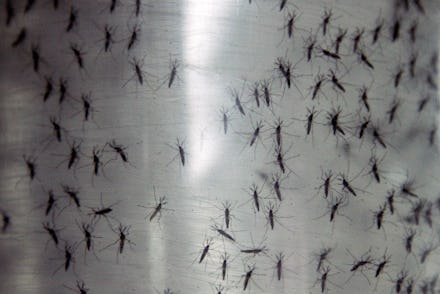Scientists Want to Unleash a Swarm Of Mutant Mosquitoes on Florida

A team of British scientists is preparing to unleash millions of genetically modified mosquitoes into the Florida Keys.
No, this isn't the plot of terrible 1993 horror movie Skeeter, though it's pretty close. The Associated Press reports that British biotech firm Oxitec, launched by Oxford University researchers, has developed a strain of mosquito that could dramatically reduce numbers of the blood-sucking pests anywhere they're released.
If the Food and Drug Administration approves their planned trial, the researchers hope they can stop the advance of debilitating tropical diseases like dengue fever and chikungunya northward as a global warming makes it easier for their hosts — the hated mosquitoes — to thrive in new and unexpected places.
The science: Oxitec's GMO mosquitoes are like regular ones, with one key difference: Their DNA contains fragments of genes taken from the herpes simplex virus, E. coli, cabbage and coral. When the modified mosquitoes breed with unmodified ones from the general population, the synthetic DNA causes them to lay eggs that hatch into young riddled with larvae-killing protein called tTAV. Oxitec attempts to release only non-biting male mosquitoes, which will mate with native females and cause entire generations of doomed offspring. Without the ability to reproduce, entire populations of the bugs succumb to the effects of tTAV, shrivel and die.
In a video from 2012, the company explained the technology behind the bug-killing genes:
According to the Associated Press, the modified mosquitoes were a success during a test run in the Cayman Islands, where a release of 3.3 million GMO bugs over six months lowered target populations by a staggering 96%. Similar experiments involving sterile mosquitoes have been so successful that Florida spends $6 million a year releasing them. But the new experiment would be the first trial involving GMO insects to ever take place near a residential area, which has left some local Floridians feeling like "guinea pigs."
Most scientists insist the perceived risks of the plan — that the modified mosquitoes could somehow be dangerous or that synthetic DNA could make it into the human body — are overblown. Discover Magazine's Christie Wilcox writes that Oxitec has done as much research as possible to ensure that tTAV isn't hypoallergenic, while the selection of male non-biting mosquitoes means the risk that GMO females will bite humans is relatively low.
As for the fear that synthetic DNA will somehow find its way into humans, genetics does not actually work that way. Wilcox explains that any foreign "DNA that enters your body is readily chopped up by enzymes." Even in laboratory conditions, Oxitec's scientists have to painstakingly inject thousands of mosquito eggs with the new DNA just to create one successful hybrid.
Real potential downsides: Instead of eliminating mosquitoes, Oxitec's plan could pave the way for an invasive species to move in and take over. The result could be wasted money and resources, or it could be a mosquito problem that's as bad or worse than the last one.
Relying on autocidal genes also poses another problem: Because it works exactly as intended, states using Oxitec technology would have to buy generation after generation of expensive GMO insects with no end in sight.
While the FDA debates whether to allow Oxitec's experiment to continue in Florida, it's clear that something needs to be done to stem the migration of tropical diseases across the globe thanks to longer breeding seasons for pests like mosquitoes. Dengue is now a serious threat in Florida, as is chikungunya.
Dealing with the bugs is easier than dealing with the outbreaks — and GMO insects could be both cheaper and more environmentally friendly than spraying pesticides. Other proposed solutions include modifying the bugs to be more vulnerable to predators or resistant to disease in the first place. Your future flyswatter could be a microscope.